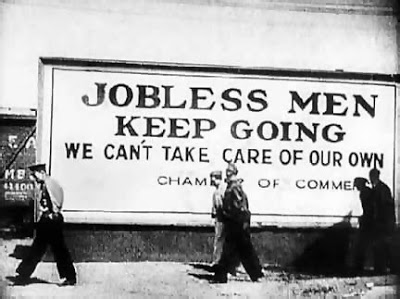‘This is not something like the Great Depression that can be corrected by a decade of hard times and even war’
By Roger Baker / The Rag Blog / September 16, 2008
I think that now that everyone is becoming aware that we are in a severe economic crisis (which became acute in August 2007 but has been papered over until now), that we should be realistic about its causes and prognosis for recovery.
This is not something like the Great Depression that can be corrected by a decade of hard times and even war and then things gradually recover on an endless upward spiral with ever more consumer goodies. This crisis (maybe “The Crash of 2008”) is about bumping up against the natural limits of the global economy to expand any more on a stressed-out planet.
Capitalist economies demand exponential growth to pay interest on investments to survive. The best visionaries have known since King Hubbert and the energy crisis of the 1970s that we would peak in world oil production some time around the year 2000, and that cheap fossil fuel energy is the limiting factor for the growth of modern industrial economies.
Therefore our modern industrial economies can’t recover from this economic crisis without a deep restructuring of capitalism that somehow breaks its deep dependence on exponential growth.
If a lack of cheap oil for transportation were not the limiting factor, it would then soon be fresh water or greenhouse gases, or arable cropland or some combination of all of these.
I am not a leading thinker on this stuff, but I have a taste of the truth and want to spread the word to those capable of listening and checking out the facts.
Read all of James Howard Kunstler’s stuff like the Long Emergency and his blog.
Read all Richard Heinberg’s stuff including The Party’s Over and his latest: Peak Everything. His blog is called Museletter.
Check out Julian Darley’s Post Carbon Institute . It’s trying to lay the basis for a transition to a community based post industrial economy.
The titans of Wall Street still don’t understand what has hit them and that conventional recovery through a materialist expanding economy is now impossible. Economic recovery will have to take the form of limiting population and living modestly and communally, and in sustainable harmony with nature, guided by the best modern scientific knowledge.
Click on “comments” to see Roger’s additional thoughts on the subject



















To my comments in the main post, I think I ought to add that high oil prices should be regarded as a somewhat hidden (especially now that falling demand has caused them to recede a bit) but still important and primary cause of the current economic crisis.
Of course under Bush particularly the credit system was vastly overextended and deregulated so the whole system became unstable. But arguably the factor that stressed the system to the breaking point was soaring energy costs.
This energy cost component of food production forced up its price together with the cost of driving, central to the US lifestyle.
This wave of cost-push inflation due to high oil prices caused a huge international consumer shift away from discretionary spending like jewelry and recreation and casual travel toward energy dependent necessities like food and fuel. Meanwhile there is constant fervent international bidding for a limited global supply of oil.
At the same time, it is well known that there is a multiplier effect to both boom and bust phases of the capitalist business cycle. A contraction in consumer spending tends to feed on itself. If a business folds, then its jobless employees cut back on spending, causing further business failures and the economic contraction spreads.
The system has been stimulated for years into an easy credit economic bubble based on foreign lending for US housing loans. Until rising energy prices became an important expansion limiting factor.
The deflationary impact of high fuel prices finally overcame in its economic influence the ability of the fed to use Keynesian stimulation (low interest rates) to keep stimulating an aging, ever-extended, poorly managed housing bubble. — Roger
Economic recovery will have to take the form of limiting population…
Fascinating post. Could you explain what you mean in the above? How would that be done? Great post, but the above gave me cause and made me think of Pol Pot. Could you explain how that can all be done in a practical way?
I don’t advocate genocide or war. I meant that human population at six billion plus has reached a point of crowding,’overshoot’ and environmental limits at which civil society will soon tend to break down into starvation, anarchy, and war.
Dr. Bruce Catton has a long “you tube” lecture on the topic of overshoot on the web. Or read chapter 6 of Heinberg’s book “Peak Everything”.